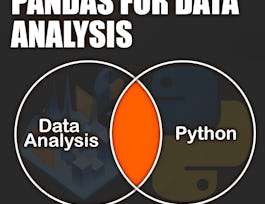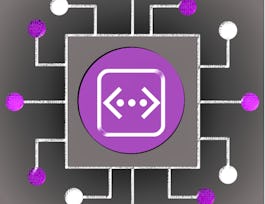Data wrangling is a crucial step in the data analysis process, as it involves the transformation and preparation of raw data into a suitable format for analysis. The "Fundamental Tools for Data Wrangling" course is designed to provide participants with essential skills and knowledge to effectively manipulate, clean, and analyze data. Participants will be introduced to the fundamental tools commonly used in data wrangling, including Python, data structures, NumPy, and pandas. Through hands-on exercises and practical examples, participants will gain the necessary proficiency to work with various data formats and effectively prepare data for analysis.



Fundamental Tools of Data Wrangling
This course is part of Data Wrangling with Python Specialization

Instructor: Di Wu
Sponsored by ITC-Infotech
1,682 already enrolled
(15 reviews)
Recommended experience
What you'll learn
You will be able to describe the fundamentals of programming in Python.
You will be able to identify data structures for efficient organization and manipulation of data.
You will practice using NumPy and Pandas for numerical computing, data manipulation, and analysis.
Details to know

Add to your LinkedIn profile
10 assignments
See how employees at top companies are mastering in-demand skills

Build your subject-matter expertise
- Learn new concepts from industry experts
- Gain a foundational understanding of a subject or tool
- Develop job-relevant skills with hands-on projects
- Earn a shareable career certificate


Earn a career certificate
Add this credential to your LinkedIn profile, resume, or CV
Share it on social media and in your performance review

There are 5 modules in this course
This week provides an introduction to the Python programming language, covering fundamental concepts and practical applications. You will gain a solid understanding of Python's syntax and semantics, enabling you to write efficient and concise code. We will also cover essential topics such as basic variables and operations, flow control structures, functions, and the utilization of external packages to enhance Python's capabilities.
What's included
4 videos7 readings3 assignments
The "Data Structures" week provides you with a comprehensive understanding of commonly used data structures for efficient organization and manipulation of data. You will explore various data structures, including strings, lists, sets, and dictionaries. Through theoretical explanations and practical examples, you will grasp the advantages of using each data structure and learn the fundamental operations associated with them.
What's included
4 videos7 readings4 assignments
The "NumPy" week serves as an introduction to the fundamental concepts and practical applications of NumPy, a powerful library for numerical computing in Python. You will gain insights into the advantages of utilizing NumPy for efficient data manipulation and mathematical operations. The week will cover the underlying data structure of NumPy arrays and guide students through basic array operations, including accessing and manipulation. Moreover, you will delve into advanced operations, such as masking and filtering, to perform complex data manipulations effectively.
What's included
3 videos4 readings1 assignment
The "Pandas" week provides you with a comprehensive introduction to Pandas, a powerful and widely used library for data manipulation and analysis in Python. You will explore the advantages of using Pandas for handling structured data efficiently. The week will cover the underlying data structure of Pandas, namely DataFrames and Series, and guide you through basic data operations, including accessing and manipulation. Moreover, you will delve into advanced data manipulations, such as masking, filtering, aggregating, pivot tables, and more, to effectively analyze and transform datasets.
What's included
3 videos4 readings1 assignment
The "Case Study" week offers you the opportunity to apply the knowledge you have gained throughout the course in a practical simulation case study. Through hands-on exercises and real-world scenarios, you will use Python and relevant packages to create a dummy dataset, mimicking a real dataset they might encounter in data analysis or scientific research. Throughout the case study, you will face challenges commonly encountered in real-world data analysis and will be encouraged to employ critical thinking and problem-solving skills to overcome them. This practical exercise will not only consolidate their understanding of Python and relevant packages but also foster a deeper appreciation for the importance of data preparation and analysis in various domains.
What's included
1 reading1 assignment
Instructor

Offered by
Why people choose Coursera for their career




Recommended if you're interested in Data Science

Johns Hopkins University

Coursera Project Network

Coursera Project Network

Duke University

Open new doors with Coursera Plus
Unlimited access to 10,000+ world-class courses, hands-on projects, and job-ready certificate programs - all included in your subscription
Advance your career with an online degree
Earn a degree from world-class universities - 100% online
Join over 3,400 global companies that choose Coursera for Business
Upskill your employees to excel in the digital economy


